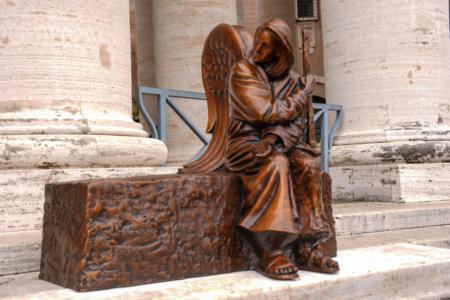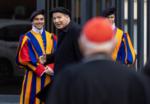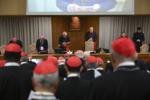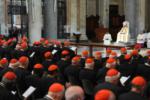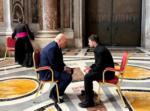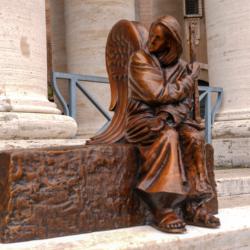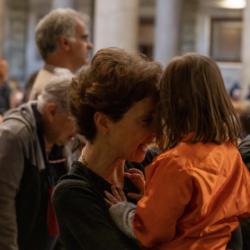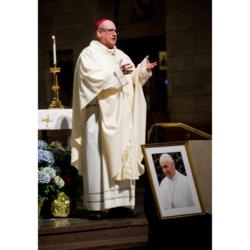Legislature considers financial disclosure bill
BOSTON—As its recess approached, the Legislature was considering a bill sponsored by Sen. Marion Walsh, D-West Roxbury, that would make religious organizations subject to the same reporting requirements as other non-profit organizations in the state.
At press time on Nov. 16, the last day of the legislative session, the bill entitled “An Act Relative to Charities,”was being debated in the House of Representatives.
If the bill does not come up for a vote before the session ends, it will remain active until the Legislature reconvenes in early January 2006.
A similar bill was passed by the State Senate 33-4 last week.
If passed, the bill “would eliminate all existing exemptions in the charitable reporting statutes for churches and religious organizations,”according to Edward Saunders, executive director of the Massachusetts Catholic Conference (MCC), the public policy arm of the Catholic Church in Massachusetts.
“This change would permit and encourage precisely the kind of government overreaching that the religious freedom provisions of the Constitutions of the United States and of the Commonwealth of Massachusetts were designed to prevent,”wrote Saunders in a letter sent to legislators Nov. 7.
Under the bill, the office of the attorney general would be given control to oversee the finances of religious organizations within the state.
In a letter sent by Walsh to the MCC Oct. 11, the senator argued that because the attorney general represents the public interest in the proper use and solicitation of charitable funds, he has the “authority to ensure that charity officials fulfill their fiduciary duties of loyalty to the charity and of due care in properly seeing that the charities carry out their mission.”
According to Saunders, religious organizations have historically been exempted from this type of direct oversight from the attorney general, in part because their purpose is not solely for charity, but for religion as well.
“Such inquiries and concerns would involve the attorney general and the courts in doctrinal debates,”Saunders wrote in a Nov. 4 letter to Walsh detailing the Church’s opposition to the bill. “They would have to decide on the religious mission and purposes of the religious entity. The Bible and other religious teachings would have to be consulted. In the end, public officials would have to determine whether this parish closing or that use of church funds comports with the religion’s doctrine.”
“Thus, your legislation would force the government to take sides on religious questions when there is a conflict about what the mission is of a religious entity and what asset-related option best complies with that mission,”continued the letter.
“Clearly this is unconstitutional,”commented Saunders during a recent interview. “It crosses the separation of church and state lines.”
In addition, Saunders was critical of parliamentary maneuvers employed by Walsh to advance her bill.
Walsh originally filed the bill, Senate Bill 1074, in December 2004 for the 2005/2006 legislative session. In August, the bill went before the Joint Committee on the Judiciary, which took it under advisement. It was released to the House on Nov. 7 with a favorable review and referred to the House Steering, Policy and Scheduling Committee.
However, before that bill could be voted on —first by the House and then by the Senate—Sen. Walsh bypassed the normal legislative process to move the matter to the Senate floor on the day the Senate was scheduled to take up health care legislation, explained Saunders.
According to Saunders, on election day Walsh convinced the Senate Ways and Means Committee in an informal session to take up an existing bill “H2313: An act authorizing the refund of the automobile sales tax to Helen Bergman of Wilmington”and add the language from her original bill, S1074. This in effect, created a new bill, numbered S2267. That bill was approved by the senate 33-4 on Nov. 9.
“On behalf of the Massachusetts Catholic Conference, I respectfully ask that you now oppose Senate Bill 2267, if not on its merits, then on the fact that its sponsor resorted to unusual, back door complex maneuvers to move it forward,”Saunders wrote in a Nov. 8 letter to legislators.
The Catholic Church is not alone in its opposition to the bill.
Criticism of legislation has come from a wide array of such religious organizations including the Massachusetts Council of Churches, an ecumenical organization which represents approximately 1,700 Orthodox and Protestant congregations; the Islamic Council of New England; the Massachusetts Association of Temple and Synagogue Administrators; the Synagogue Council of Massachusetts; the Black Ministerial Alliance; the Massachusetts Family Institute; and the Christian Science Church.
Some have been openly critical of the bill’s backers, maintaining that most are disenfranchised Catholics angry at the archdiocese’s handling of the clergy abuse crisis and parish reconfiguration.
Laura Everett, program associate at the Massachusetts Council of Churches, said, “This clearly is a misguided legislative attempt targeting the Archdiocese of Boston. In a recent hearing, one of the bill’s co-sponsors said that he believed this legislation would ‘restore peoples’faith in the church.’We need to remember that there are many churches and many faith traditions in this Commonwealth. And while many may want faith to be restored, it is not now, nor has it ever been, the legislature’s task to do so.”
Others have voiced their unease at Legislature using its power to affect change in the Archdiocese of Boston. They have also noted a lack of credence given to opposition from other religious communities.
In a letter to Senate leadership, Bishop Peter Weaver of the New England Conference of the United Methodist Church wrote, “I am concerned that the whole religious community is being unfairly targeted because of the political pressures you may be experiencing due to the problems of only one of our number…I do not oppose the churches and state working together in reasonable ways, but I do oppose the state making intrusive demands without any respect for the input from the religious institutions you’re proposing to regulate.”
Critics of the bill also point out that the cost of complying with the legislation would be burdensome for religious organizations. According to Saunders, “the Archdiocese of Boston has estimated that compliance to this bill would cost $3 million per year for the audits necessary,”a figure which amounts to nearly one quarter of the archdiocese’s annual appeal donations.
“The question must be asked by the supporters of this bill,”stressed Saunders. “What social programs helping people out in the neighborhoods should we do away with in order to comply with this audit?”
